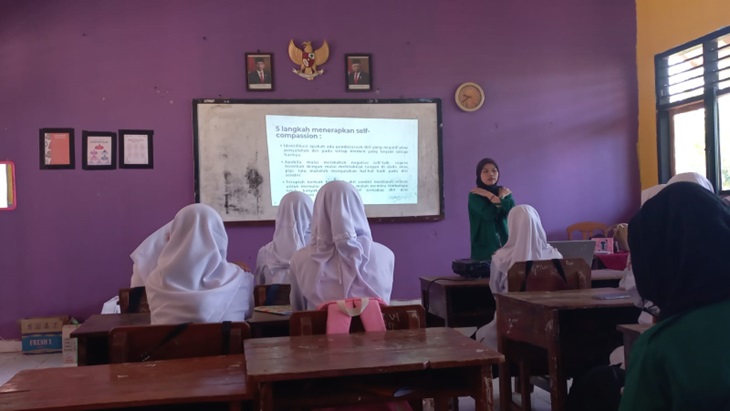Meningkatkan Pemahaman Self-Compassion untuk Mengatasi Prokrastinasi Akademik pada Siswa SMP di Kabupaten Cirebon Enhancing Understanding of Self-Compassion to Address Academic Procrastination among Junior High School Students in Cirebon Regency
Main Article Content
Abstract
One of the obstacles in the learning process that students often face is the desire to procrastinate. This condition has the potential to make students feel self-guilt, regret, and excessive self-deprecation for neglecting their duties. In response to this, efforts are needed to increase students' understanding of academic procrastination and the importance of fostering self-compassion in themselves, one of which is by conducting psychoeducation. Psychoeducation activities are carried out in three stages, namely the planning, implementation, and evaluation stages of the activity. The participants in this activity were students of class IX-A at SMPN 2 Lemahabang, Cirebon Regency. This activity uses a questionnaire containing the same questions for the pre-test and post-test to measure participants' understanding before and after the activity. Analysis of the pre-test and post-test results showed that students experienced an increase in understanding after being given psychoeducation. Qualitatively, students also seemed enthusiastic and focused on the material presented. Thus, it can be concluded that the psychoeducation activities on academic procrastination and self-compassion have achieved the objectives set.
Downloads
Article Details

This work is licensed under a Creative Commons Attribution-ShareAlike 4.0 International License.
Authors who publish with this journal agree to the following terms:
- Any article on the copyright is retained by the author(s).
- Author grant the journal, right of first publication with the work simultaneously licensed under a Creative Commons Attribution License that allows others to share work with acknowledgment of the work authors and initial publications in this journal.
- Authors are able to enter into a separate, additional contractual arrangements for non-exclusive distribution of published articles of work (eg, post-institutional repository) or publish it in a book, with acknowledgment of its initial publication in this journal.
- Authors are permitted and encouraged to post their work online (e.g., in institutional repositories or on their websites) prior to and during the submission process, as can lead to productive exchanges, as well as earlier and greater citation of published work.
- The article and any associated published material is distributed under the Creative Commons Attribution-ShareAlike 4.0 International License
References
Amin, G. (2019). Academic Procrastination of College Students. Jurnal Muara Ilmu Ekonomi dan Bisnis, 3(2), 431–442. https://doi.org/10.24912/jmieb.v3i2.7346
Ananda, A., & Alwi, M. A. (2023). Hubungan antara Fear of Failure dengan Prokrastinasi Akademik pada Siswa SMK Negeri 3 Bone. Madani: Jurnal Ilmiah Multidisipline, 1(10), 226–231.
Asmalı, M., & Sayın, S. D. (2022). Academic Procrastination in Language Learning: Adolescent Learners’ Perspectives. Acuity: Journal of English Language Pedagogy, Literature, and Culture, 7(2), 220–235. https://doi.org/10.35974/acuity.v7i2.2637
Astuti, Y., Nisa, H., Sari, K., & Kumala, I. D. (2021). Perbedaan Prokrastinasi Akademik Ditinjau Dari Jenis Kelamin Pada Mahasiswa. Seurune : Jurnal Psikologi Unsyiah, 4(2), 169–184. https://doi.org/10.24815/s-jpu.v4i2.22108
Balan, Y., Keo, G. D., Taneo, D. R., Messakh, M. T. L. L. C., & Naisanu, M. F. (2023). Korelasi antara Regulasi Diri dengan Perilaku Prokrastinasi Akademik pada Mahasiswa Program Studi Pastoral Konseling IAKN Kupang. Journal Didache of Christian Education, 3(2), 66–73. https://doi.org/10.52960/jd.v3i2.241
Gustiani, P. W., Dewi, D. P., Pramesti, P. A., Endriyani, Y., Nurhidayah, S., & Prestiana, N. D. I. (2022). Pelatihan Manajemen Waktu untuk Mencegah dan Menangani Prokrastinasi Akademik pada Pengurus Osis. Konferensi Nasional Penelitian dan Pengabdian (KNPP), 2(1), 1485–1494.
Husain, A. R., Wantu, T., & Pauitina, M. R. P. (2023). Perilaku Prokrastinasi Akademik dan Faktor Penyebabnya pada Mahasiswa. Studen Journal of Guidance and Counselling, 2(2), 145–157. http://www.jurnal.unsyiah.ac.id/suloh/article/view/12916
Jadidah, I. T., Canavallia, B. G., Dita, E. N., Hidayanti, F. N., & Pratiwi, S. (2023). Faktor Penyebab Perilaku Prokrastinasi Akademik pada Mahasiswa FITK Angkatan 2021 UIN Raden Fatah Palembang. JIMR : Journal Of International Multidisciplinary Research, 2(2), 180–188.
Kurtovic, A., Vrdoljak, G., & Idzanovic, A. (2019). Predicting Procrastination: The Role of Academic Achievement , Self-efficacy and Perfectionism. International Journal of Educational Psychology, 8(1), 1–26. https://doi.org/10.17583/ijep.2019.2993
Laia, B., Zagoto, S. F. L., Fau, Y. T. V., Duha, A., Telaumbanua, K., Lase, I. P. S., Ziraluo, M., Duha, M. M., Laia, B., Luahambowo, B., Fau, S., Hulu, F., Telaumbanua, T., & Harefa, D. (2022). Prokrastinasi Akademik Siswa SMA Negeri di Kabupaten Nias Selatan. Jurnal Ilmiah Aquinas, 5(1), 162–168. http://ejournal.ust.ac.id/index.php/Aquinas/index
Lestari, A. D. A., Pramono, A., & Firmansyah, M. (2020). Pengaruh Psikoedukasi Pencegahan Penyalahgunaan Narkoba Terhadap Komponen Sikap Pada Siswa SMP. Jurnal Kedokteran Komunitas, 8(1), 1–7.
Permana, B. (2019). Gambaran Prokrastinasi Akademik Siswa SMA Darul Falah Cililin. FOKUS (Kajian Bimbingan & Konseling Dalam Pendidikan), 2(3), 87–94. https://doi.org/10.22460/fokus.v2i3.4498
Rahmania, A. M., Budi, W., & Utami, D. N. (2021). Gambaran Prokrastinasi Akademik Siswa SMP di Daerah Pesisir Surabaya. Jurnal Psikologi: Media Ilmiah Psikologi, 19(1), 1–7.
Rananto, H. W., & Hidayati, F. (2017). Hubungan antara Self-Compassion dengan Prokrastinasi pada Siswa SMA Nasima Semarang. Jurnal Empati, 6(1), 232–238.
Rifa’i, H. R., & Syahrina, I. A. (2019). Hubungan antara Self Regulated Learning dan Self-Compassion dengan Prokrastinasi Akademik pada Siswa Kelas XI di MAN 2 Solok. Jurnal Psyche, 12(2), 134–143.
Rohaeni, F., & Coralia, F. (2024). Pengaruh Fear of Failure terhadap Prokrastinasi Akademik Mahasiswa Skripsi di Kota Bandung. Bandung Conference Series: Psychology Science, 4(1), 289–295
Santos, I. L. S., Pimentell, C. E., & Mariano, T. E. (2022). Self-deprecation: Searching for a Measure. Psicogente, 25(48), 1–19. https://doi.org/10.17081/psico.25.48.4821
Sarasija, L. N. A. S., Nariswari, A. A., Dewanggana, D. A., Arghita, V. A., Patty, T. S. W., & Tjahjono, H. (2021). Psikoedukasi “PerPro” untuk Menurunkan Prokrastinasi Akademik dengan Menggunakan Manajemen Waktu pada Siswa Siswi SMP dan SMA/SMK. Jurnal Psikologi Konseling, 18(1), 922–933. https://doi.org/10.53624/ptk.v1i1.2
Zega, M. R. B. (2022). Faktor Penyebab dan Upaya Mengatasi Prokrastinasi Akademik Peserta Didik Pada Masa Pandemi Covid-19. Bulletin of Counseling and Psychotherapy, 4(1), 28–35. https://doi.org/10.51214/bocp.v4i1.134
